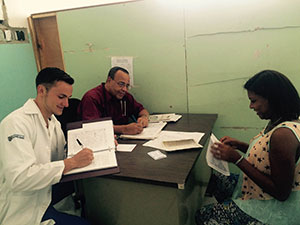
Kellogg international development studies (IDS) minor Nick Nissen ’16 saw his decision to major in Spanish while preparing for a career in medicine as a leap of faith – and one that has paid off.
At Notre Dame, Nissen majored in Spanish and Arts & Letters pre-health, with a minor in international development studies. He went on to medical school at Brown University and is now completing his residency at Harvard Medical School.
Studying Spanish turned out to be one of the best decisions he has ever made, he said. He is now a certified Spanish language speaking provider at his hospital and uses the language daily to communicate with patients, without needing an interpreter.
“In the College of Arts & Letters, I felt encouraged by my advisors to go ahead and do something that was really interesting to me. And it worked out perfectly,” he said. “It is so empowering to say, ‘stop thinking about what everyone else is doing, stop thinking about what you feel obligated to do, and start thinking about what your true interests are.’ Because if you pursue your true interest and pursue it well, you'll be able to achieve your career goals through it.”
In addition to working in a hospital, Nissen is a doctor on the medical unit for ABC News — editing content for medical accuracy, writing articles on the intersection between mental health and the COVID-19 pandemic, and contributing to their social media channels. He recently appeared on Good Morning America to discuss the relationship between insomnia and COVID-19.
“It is so empowering to say, ‘stop thinking about what everyone else is doing, stop thinking about what you feel obligated to do, and start thinking about what your true interests are.’ Because if you pursue your true interest and pursue it well, you'll be able to achieve your career goals through it.”

Nissen relies on the writing and communication skills he developed through an Arts & Letters education as well as the interviewing and research skills he developed working with his IDS adviser and Kellogg Faculty Fellow Vania Smith-Oka, associate professor of anthropology. Together, they examined why the rates of c-sections vary among different populations in Latin America.
“How do you make people comfortable enough in an interview to give real answers, as opposed to just, saying yes or no and whatever they think you want them to say?” Nissen said. “Learning skills like that – that I continue to use in medicine, as well as in medical journalism – has been invaluable,” he said.
Nissen initially aspired to become a reconstructive plastic surgeon to help children with cleft lips and palates who are often outcast because of their illness gain a sense of belonging. Encountering the intense stigma and rejection that psychiatric patients – especially those with addictions – face inspired him to pursue a career in psychiatry instead of surgery.
“Why is it that we judge and even reject those amongst us that have a disease that they have no control over?” he said. “My goal is to help get our world to a place where we see mental illnesses as brain illnesses that needs to be taken just as seriously as heart or lung illness – and for people to no longer think of themselves as weak or defective or lazy if they are dealing with depression, but to see their doctor and seek treatment without even having a moment of guilt or self-judgment.”
Nissen’s interest in psychiatry and mental health has expanded past the exam room. At the start of the pandemic, he wrote and published a children’s book, Emily Empathy, to teach young children how to empathize and grow their emotional intelligence by noticing how others feel in different situations.
He has also started writing another book on the physical nature of mental illnesses.
“If I could write a book that would, for once and for all, dispel the myth that depression is a disease of personal failure – and that it is, in fact, a physical, biological disease – that would be hugely rewarding for society,” he said. “The goal of the book is to show the evidence that mental illnesses are brain illnesses.”
Another mental health project that Nissen is working on is his podcast, Brain Health with Dr. Nissen, in which he interviews brain and mental health experts on topics such as lifestyle changes to help prevent dementia, the physical causes behind depression, and how to grow emotional intelligence.
Nissen’s wide-ranging projects would not have been possible, he believes, had he not pursued his interests as an undergraduate through an interdisciplinary Arts & Letters education.
“I truly got to study what I loved,” he said. “I think that can be the case for a lot of people if you have faith in your advisors and have faith in Notre Dame – you will go further by pursuing what you enjoy, rather than what you think you must do.”





